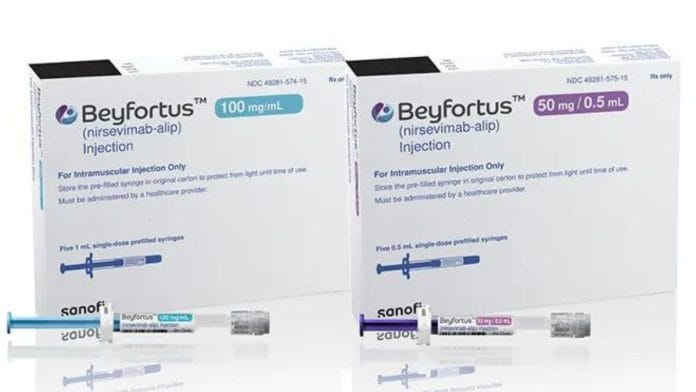New Delhi: The Central Drugs Standard Control Organisation (CDSCO), India’s apex drug controller, has approved Beyfortus, a medicine for use in all infants against Respiratory Syncytial Virus (RSV) — the top cause of hospitalisation for babies under the age of two in the country. The drug received approval in June this year, French multinational pharmaceutical company Sanofi announced Thursday.
RSV infects the nose, lungs and respiratory tract, causing cold-like symptoms. Two out of three infants are infected with RSV during their first year of life and almost all children are infected by their second birthday.
Beyfortus contains the monoclonal antibody nirsevimab. A monoclonal antibody is a laboratory-made protein that binds only to one antigen, and helps fight off germs. Engineered as a substitute to an antibody, it is an example of passive immunisation.
Nirsevimab helps prevent severe lung infections such as pneumonia caused by RSV in infants and young children.
Beyfortus is manufactured and developed by British-Swedish pharmaceutical and biotechnology firm AstraZeneca, and commercialised by Sanofi (India). So far, the drug has been approved for use in the European Union (EU), the US, Japan, and a few other countries.
Beyfortus is the first immunisation drug designed for all infants for protection against RSV through their first RSV season (late summer and early fall), including for those born healthy at term or preterm, or with specific health conditions that make them vulnerable.
The drug contains nirsevimab in a prefilled injection, and is used for the prevention of RSV lower respiratory tract disease (LRTD) in newborns and infants born during or entering their first RSV season.
Beyfortus is also administered in children up to 24 months of age, who remain vulnerable to severe RSV disease through their second RSV season.
As opposed to active immunisation that entails administering antigens (or, parts of a pathogen) against which the body releases its own antibodies so that it is prepared for future encounters with the pathogen, passive immunisation involves administering ready-made antibodies against a disease-causing agent.
RSV is a major global health concern, causing millions of outpatient visits, hospitalisations, and even deaths among those most vulnerable (infants and the elderly) each year.
While the majority of cases present with mild cold-like symptoms, RSV can also progress to lower respiratory tract infections, leading to hospitalisation and potentially causing death in a large number of those affected, according to experts.
In addition to being the most common cause of lower respiratory infection such as bronchiolitis and pneumonia in infants, RSV is also a leading cause of hospitalisation in infants worldwide, with most hospitalisations occurring in healthy infants born at term.
“Prevention of RSV in India is still an unmet medical need. We are prioritising this potential game-changer to make Beyfortus available for all Indian parents to help protect their babies during their first and second RSV seasons,” Preeti Futnani, general manager, Sanofi Vaccines (India), said in a statement.
A company spokesperson, however, told ThePrint that details related to the launch of Beyfortus and its price in the country are yet to be finalised.
Reports suggest that there have been shortages of the vaccine in countries such as the US, where it has been launched owing to heavy demands.
How India will benefit from Beyfortus
A pulmonologist with the All India Institute of Medical Sciences (AIIMS), New Delhi, told ThePrint that babies less than 6 months old, preterm babies, and those with other medical conditions can develop severe RSV infection or bronchiolitis and may have trouble breathing, requiring hospitalisation.
This fact has also been acknowledged by health policy makers.
ThePrint had earlier reported that a working group under National Technical Advisory Group on Immunisation (NTAGI), the country’s apex immunisation advisory body, had been constituted to consider the possibility of introducing a vaccine against RSV for infants and toddlers under two years as part of the Centre’s Universal Immunization Programme (UIP).
Dr Kuharaj Mahenthiran, country medical head, Sanofi Vaccines (India), told ThePrint that data gathered from all geographical regions of India from 1970 through 2020 to assess the burden of respiratory viruses and their prevalence found RSV to be the most prevalent respiratory virus (nearly 29 percent) in the country, followed by Influenza A virus.
The CDSCO’s approval for Beyfortus was based on a clinical programme spanning three pivotal late stage clinical trials, Dr Mahenthiran said, adding that across all clinical endpoints, a single dose of Beyfortus demonstrated high and consistent efficacy against RSV-induced LRTD in all infant populations studied.
“These included babies born healthy at term, late preterm or preterm, or with specific health conditions that make them vulnerable to severe RSV disease. Beyfortus was also well tolerated with a favourable safety profile that was consistent across all clinical trials,” Dr Mahenthiran said.
As a long-acting antibody provided directly to newborns and infants as a single dose, Beyfortus offers rapid protection via an antibody to help prevent LRTD caused by RSV, without requiring activation of the immune system, according to Sanofi.
Beyfortus’s administration can be timed to the start of the RSV season.
Last year, AstraZeneca had received the CDSCO’s approval to import and market palivizumab injection, indicated for the prevention of serious LRTD, in preterm and high-risk babies under the age of 6 months.
This drug, however, is yet to be launched in the country. ThePrint reached AstraZeneca for a comment on this over email. This copy will be updated if and when a response is received.
(Edited by Radifah Kabir)
Also read: India seeing worst Chandipura virus outbreak in over 2 decades. Here’s what you need to know






